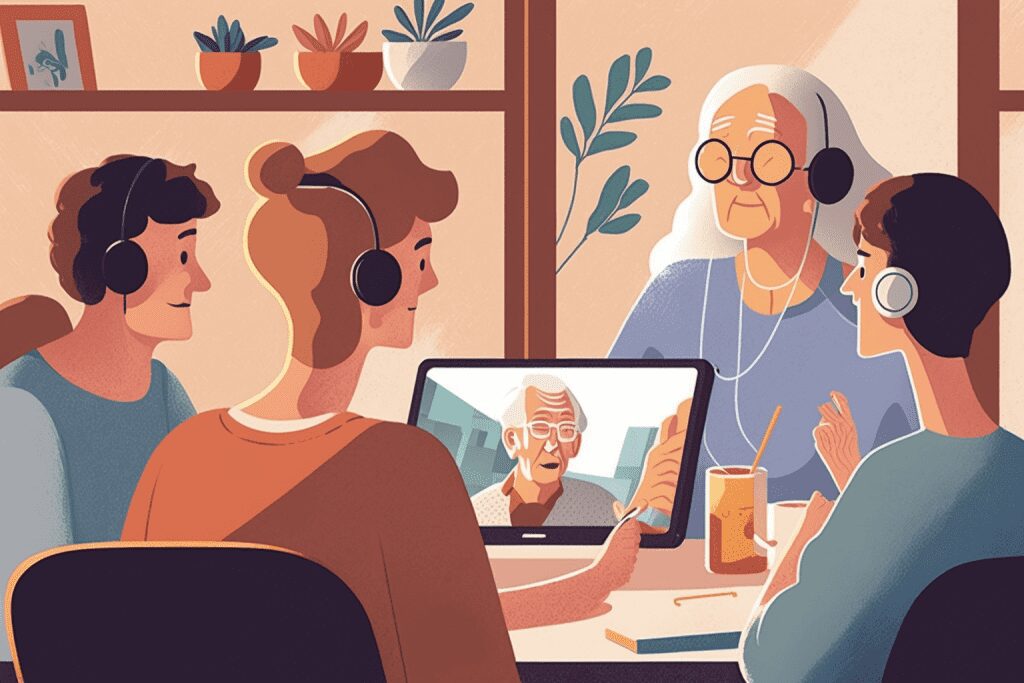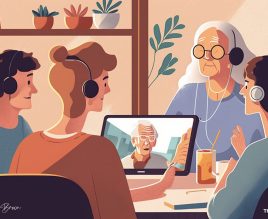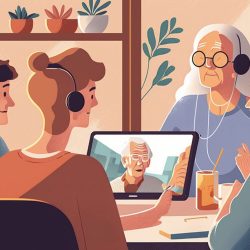Table of Contents
ToggleThe tech world of the baby boomers generation refers to the group of individuals born between 1946 and 1964 during the post-World War II economic boom. This generation currently makes up a significant portion of the population, with distinct cultural, social, and economic characteristics that set them apart from other age groups.
As baby boomers enter retirement, understanding their technology use is crucial for several reasons. First, it helps developers and marketers create products and services tailored to their needs. Second, it allows policymakers to better address the challenges an aging population faces. Finally, it fosters intergenerational connections and encourages lifelong learning.
This article explores the various facets of technology use among baby boomers. It will cover topics such as early exposure to technology, internet and social media usage, online shopping, entertainment, health and fitness, smart home technology, mobile devices, lifelong learning, travel planning, financial technology, job market and remote work, accessibility, technology creation, privacy, security, and environmental impact. Additionally, the article will address frequently asked questions about baby boomers and technology.
Baby Boomers’ Early Exposure To Technology
Baby boomers grew up during a time of rapid technological innovation. Some notable advancements during their formative years include the introduction of color television, transistor radios, and mainframe computers. These early innovations shaped baby boomers’ technology use and paved the way for adopting modern devices and platforms.
Influence of Early Adoption on Tech Usage Patterns
Early exposure to technology influenced baby boomers’ tech usage patterns by familiarizing them with electronic devices and fostering an appreciation for innovation. As a result, many baby boomers are comfortable with technology and are more likely to adopt new devices and platforms than older generations.
The Transition From Analog to Digital Technology
The transition from analog to digital technology has been a defining feature of baby boomers’ tech experience. Many boomers have successfully adapted to the digital age by learning to use computers, smartphones, and the internet, even though they grew up in an era dominated by analog devices such as typewriters and rotary phones.
Internet And Social Media Usage

Baby boomers are active users of social media platforms such as Facebook, LinkedIn, and Pinterest. These platforms allow them to stay connected with family and friends, share experiences, and discover new interests. As digital natives, they have adapted to the evolving technological landscape, embracing the convenience and social connectedness offered by these platforms.
Connecting With Family and Friends
One of the primary reasons baby boomers use social media is to maintain connections with family and friends. They often use platforms such as Facebook and Instagram to share updates, photos, and life events, allowing them to stay in touch with loved ones despite geographical distance.
Exploring Online Communities and Interest Groups
Baby boomers also use social media to explore online communities and interest groups that align with their hobbies and passions. These communities offer a space for boomers to engage with like-minded individuals, exchange ideas, and gain new knowledge. By participating in these groups, baby boomers can expand their social networks, learn from others, and stay mentally stimulated.
Online Shopping And E-Commerce
Baby boomers have embraced online shopping as a convenient way to purchase goods and services. They prioritize websites with easy navigation, clear product descriptions, and a secure checkout process. Customer reviews and recommendations also play an essential role in their decision-making process.
Popular Products and Services
Some popular products and services among baby boomers include clothing, electronics, travel, and home goods. They are also increasingly interested in digital products like ebooks, streaming services, and online courses. Health and wellness products and items tailored to their specific age group are also popular among this demographic.
Trust and Security Concerns in Online Transactions
Baby boomers are cautious about online transactions and prioritize the security of their personal and financial information. They are likelier to trust well-established e-commerce websites and may be hesitant to shop on unfamiliar platforms. Educating baby boomers about safe online shopping practices and the importance of strong passwords can help alleviate their security concerns.
Entertainment And Streaming Platforms

Baby boomers have adopted music and video streaming services like Spotify, Netflix, and YouTube, allowing them to access a wide range of content on demand. These services cater to their preferences, offering nostalgic content alongside contemporary media and providing a personalized experience based on individual tastes.
Baby Boomers and the Rise of Podcasts
Podcasts have become increasingly popular among baby boomers, who appreciate the convenience of on-demand audio content. They listen to podcasts on various topics, including news, storytelling, history, and self-improvement, offering entertainment and lifelong learning.
Online Gaming and Virtual Reality Experiences
While not as prevalent as younger generations, some baby boomers have embraced online gaming and virtual reality experiences. These platforms provide an opportunity for social interaction, cognitive stimulation, and entertainment. Through multiplayer games, boomers can connect with friends and family, challenging their cognitive abilities and promoting mental agility.
Health And Fitness Technology

Baby boomers are adopting wearable health and fitness devices such as smartwatches and fitness trackers to monitor their physical activity, heart rate, and sleep patterns. These devices help them stay motivated, set personal goals, and maintain a healthy lifestyle. This adoption of wearable technology promotes a proactive approach to health and wellness, empowering baby boomers to take charge of their well-being.
Telemedicine and Remote Healthcare Services
Telemedicine and remote healthcare services have gained popularity among the tech world of baby boomers, providing convenient access to medical professionals and reducing the need for in-person appointments. These services are particularly valuable for those with mobility issues or living in rural areas with limited access to healthcare facilities.
Health and Wellness Apps
Health and wellness apps cater to baby boomers’ desire to maintain their well-being as they age. These apps offer features such as medication reminders, nutrition tracking, and guided meditation to support a healthy lifestyle. By incorporating these tools into their daily routines, baby boomers can more easily manage their health, reduce stress, and maintain a balanced lifestyle.
Smart Home Technology

Baby boomers are increasingly adopting smart home devices such as smart thermostats, lighting systems, and voice-activated assistants. These devices offer convenience, improved energy efficiency, and enhanced security. By automating everyday tasks and optimizing energy consumption, baby boomers can enjoy a more comfortable and efficient living environment.
Energy Management and Home Automation
Energy management and home automation systems appeal to baby boomers’ desire for an eco-friendly and cost-efficient lifestyle. These systems enable them to monitor and control energy consumption, reducing their environmental impact and saving money. By adopting smart technology that learns their habits and preferences, boomers can optimize their energy usage and minimize waste.
Security Systems and Surveillance
Home security systems and surveillance cameras offer baby boomers peace of mind and increased safety. They can remotely monitor their homes, receive notifications of potential security breaches, and access live video feeds from their smartphones. These advanced security features provide reassurance and protection, allowing baby boomers to feel more secure in their homes.
Mobile Devices And Communication
Most baby boomers have adopted smartphones for communication, navigation, and internet access. They tend to prioritize ease of use and functionality over cutting-edge features and may be more likely to choose devices with larger screens and intuitive interfaces.
Messaging Apps and Video Calling Services
Messaging apps like WhatsApp and video calling services like Zoom and FaceTime have become essential tools for baby boomers to stay connected with family and friends. These platforms enable them to maintain relationships across long distances and bridge the gap between generations.
Navigating Mobile App Stores and App Recommendations
Baby boomers often rely on app recommendations from friends, family, or online sources to navigate the vast array of available mobile apps. They may also prefer apps that are easy to use, visually appealing, and provide clear instructions or tutorials. This preference for user-friendly and intuitive design reflects their desire for simplicity and efficiency when interacting with technology.
Lifelong Learning And Online Education
Many baby boomers have embraced online courses to acquire new skills or pursue their interests. Websites such as Coursera, Udemy, and LinkedIn Learning offer various courses in various subjects, enabling boomers to engage in lifelong learning and personal development.
Baby Boomers and MOOCs (Massive Open Online Courses)
MOOCs have gained popularity among baby boomers due to their accessibility and flexibility. These courses, often offered by prestigious universities, allow baby boomers to learn at their own pace and access high-quality educational content from the comfort of their homes.
Digital literacy initiatives and resources
Digital literacy initiatives like computer classes and online tutorials help baby boomers improve their technology skills and feel more confident using modern devices and platforms. These resources often cover internet safety, social media, and online communication.
Travel Planning And Booking

Baby boomers have adopted online travel agencies and booking platforms like Expedia and Airbnb to plan and book their trips. These platforms offer convenience, competitive pricing, and the ability to read reviews from fellow travelers. By using these services, boomers can research and compare options, customize their travel experiences, and make informed decisions. This access to a wealth of information and resources enables them to create memorable and tailored travel experiences.
Mobile Travel Apps and Services
Mobile travel apps, such as Google Maps and Tripadvisor, have become indispensable tools for baby boomers when planning and navigating their trips. These apps provide information on local attractions, restaurants, and accommodations, helping boomers make informed decisions and enhance their travel experiences.
Virtual Tourism Experiences
Virtual tourism experiences, such as 360-degree videos and virtual reality tours, follow the tech world of baby boomers to explore destinations and attractions from the comfort of their homes. While not a replacement for physical travel, these experiences can inspire future trips or provide an alternative for those with limited mobility.
Financial Technology (FinTech)
Baby boomers have increasingly adopted online banking and mobile payment services, such as PayPal and Venmo, for convenience and ease of use. These services allow them to manage their finances, pay bills, and transfer money with just a few clicks. By embracing digital financial tools, baby boomers can streamline their financial management, save time, and gain better control over their money.
Investment Platforms and Robo-Advisors
Investment platforms and robo-advisors, such as Betterment and Wealthfront, appeal to baby boomers seeking to manage their investments and retirement plans. These services offer personalized investment advice, portfolio management, and financial planning tools to help them achieve their financial goals.
Cryptocurrency And Blockchain Technology
While less widespread among baby boomers than younger generations, some boomers have shown interest in cryptocurrency and blockchain technology. They may view these innovations as potential investment opportunities or a means to diversify their portfolios.
Job Market And Remote Work
Baby boomers utilize job search and networking platforms like LinkedIn and Indeed to explore new career opportunities, connect with colleagues, and stay informed about industry trends. These platforms help them remain competitive in the job market and facilitate professional growth.
Baby Boomers in the Gig Economy
Some baby boomers have entered the gig economy, taking on freelance or part-time roles to supplement their income or pursue their passions. Platforms like Upwork, Fiverr, and TaskRabbit offer many opportunities for boomers to leverage their skills and expertise.
Remote Work Tools and Collaboration Software
As remote work becomes increasingly popular, baby boomers have adopted remote work tools and collaboration software, such as Slack, Microsoft Teams, and Google Workspace. These tools enable them to communicate effectively with team members, manage projects, and maintain productivity while working from home.
Accessibility And Assistive Technology
Baby boomers with hearing or vision impairments can benefit from various assistive technologies, such as hearing aids with Bluetooth capabilities, screen readers, and magnification software. These devices and tools enable them to navigate the tech world of baby boomers more easily and remain independent.
Voice-Activated and Gesture-Based Technology
Voice-activated devices like Amazon Echo and Google Home, as well as gesture-based technologies, can be particularly helpful for baby boomers with mobility or dexterity issues. These technologies provide a hands-free way to control devices and access information, making everyday tasks more manageable.
Tech Solutions for Cognitive and Mobility Challenges
Baby boomers facing cognitive or mobility challenges can benefit from various tech solutions, such as GPS trackers, fall detection devices, and medication reminders. These tools help them maintain their safety, well-being, and independence. By leveraging technology, boomers can address age-related challenges and continue to live fulfilling lives. These innovative solutions empower them to maintain autonomy and dignity while receiving essential support.
Baby Boomers As Technology Creators
Many baby boomer entrepreneurs have significantly contributed to the tech industry, launching successful startups and developing innovative products and services. Their wealth of experience and unique perspectives bring valuable insights to the technology landscape.
Contributions to the Development of New Technologies
Baby boomers have played a crucial role in developing new technologies, contributing their expertise in software development, hardware engineering, and user experience design. Their involvement in the technology sector has helped shape the products and services that are now integral to our daily lives.
Mentorship and Intergenerational Collaboration
Baby boomers often mentor younger generations in the tech industry, sharing their knowledge, experience, and wisdom. This intergenerational collaboration fosters innovation, mutual learning, and a more inclusive technology landscape. By bridging generational gaps, baby boomers and younger professionals can create synergies, drive growth, and develop new solutions that benefit society as a whole.
Privacy and Security Concerns
Baby boomers tend to value privacy and may be more cautious about sharing personal information online than younger generations. They often prioritize security features and privacy settings when using digital platforms and services. This focus on privacy and security reflects their awareness of potential risks associated with online activity and their commitment to protecting their personal information.
Navigating the World of Online Scams and Phishing
Online scams and phishing attempts often target baby boomers. It’s essential to educate this demographic about the warning signs of such threats and provide them with tools and resources to stay safe online. By raising awareness and promoting digital literacy, baby boomers can better protect themselves from cyber threats and maintain their online safety.
Tips for Maintaining Cybersecurity
Encouraging baby boomers to adopt best practices for cybersecurity, such as using strong passwords, enabling two-factor authentication, and updating software regularly, can help protect them from potential cyber threats. These proactive measures enhance their digital security, safeguarding their personal information and online experiences.
Environmental Impact of Technology Use
Baby boomers can play a role in mitigating the environmental impact of technology use by participating in electronic waste recycling initiatives. Proper disposal of electronic devices helps reduce toxic waste and conserve valuable resources. By engaging in responsible recycling practices, baby boomers can contribute to a more sustainable future and set an example for other generations.
Energy-Efficient Devices and Sustainable Tech Choices
Energy-efficient devices and sustainable technology options, such as solar-powered chargers and smart home automation systems, can help baby boomers reduce their carbon footprint and contribute to a greener future. By choosing eco-friendly products and services, they demonstrate their commitment to environmental stewardship and promote a culture of sustainability.
Ethical Considerations and Responsible Technology Use
Baby boomers can make more informed and ethical technology choices by considering data privacy, environmental impact, and fair labor practices when purchasing devices and using digital services. By actively evaluating the ethical implications of their choices, they can support responsible technology development and foster a more equitable, sustainable, and socially-conscious digital landscape.
Conclusion
This article has explored how baby boomers engage with technology, from their early exposure to technological innovations to their current usage patterns across various digital platforms and services. As a diverse and influential demographic, baby boomers have shown a remarkable ability to adapt to the rapidly evolving tech landscape.
As technology advances, baby boomers can be expected to embrace further digital tools and platforms that enhance their lives, improve their well-being, and facilitate communication with friends and family. The tech industry must continue to develop accessible, user-friendly, and secure products that cater to this generation’s unique needs and preferences.
Technology has the potential to bridge the generational divide by fostering intergenerational collaboration, promoting lifelong learning, and enabling baby boomers to remain connected with younger generations. By embracing technology and sharing their knowledge and experiences, baby boomers can contribute to a more inclusive and diverse tech world of baby boomers.
Want to learn more about baby boomers? Click here.
Frequently Asked Questions (FAQs)
Are baby boomers resistant to adopting new technology?
While some baby boomers may initially resist adopting new technology, many have demonstrated a willingness to learn and adapt to the tech world of baby boomers. As long as technology is accessible, user-friendly, and secure, baby boomers will likely embrace and incorporate it into their lives.
What are the most popular social media platforms among baby boomers?
Popular social media platforms among baby boomers include Facebook, Instagram, LinkedIn, and Pinterest. These platforms enable them to connect with friends and family, share content, and explore their interests.
How can baby boomers protect themselves from online scams and fraud?
Baby boomers can protect themselves from online scams and fraud by staying informed about common threats, using strong passwords, enabling two-factor authentication, and being cautious about sharing personal information online. They should also be vigilant in identifying potential scams and reporting suspicious activity to the appropriate authorities.
What resources are available for baby boomers to improve their digital literacy skills?
Numerous resources are available to help baby boomers improve their digital literacy skills, such as computer classes at local community centers, online tutorials, and educational websites. These resources often cover essential topics like internet safety, social media, and online communication, empowering baby boomers to navigate the tech world of baby boomers confidently.
References
- https://scholarworks.uark.edu/
- https://dc.uwm.edu/
- https://www.gwi.com/


















2 Comments
[…] Also read: Baby Boomers in the Digital Age: An In-depth Analysis […]
[…] Also read: Baby Boomers in the Digital Age: An In-depth Analysis […]